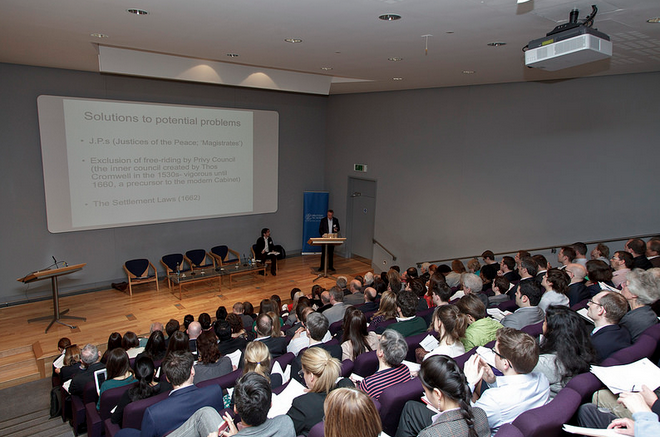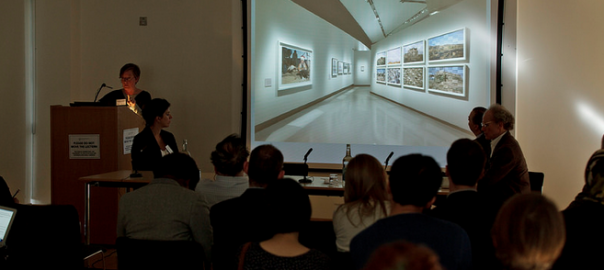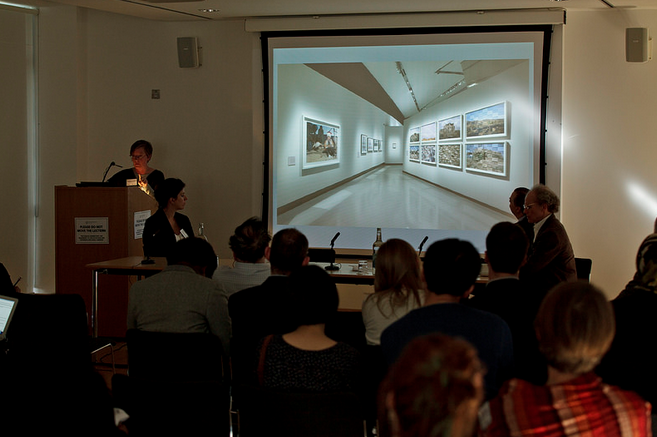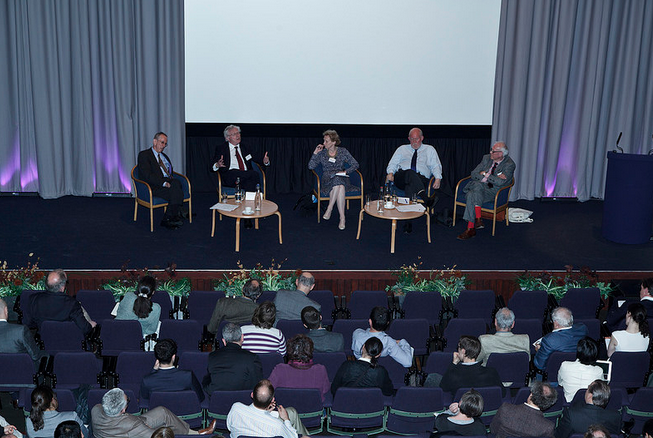By: Dr Clare Moran

The sun was shining on Buckingham House, Murray Edwards College, as we gathered for the Centre for Science and Policy’s 2015 Annual Conference: How can government make better use of expertise and evidence from the humanities. The conference explored the convergence of past and future, furthering CSaP’s vision of greater engagement between science and policy in the august setting of the University of Cambridge. Appropriately we were hosted by two modernist colleges built with the future in mind. Both colleges were founded on the Enlightenment values that guide CSaP’s work, the first to provide a ‘third foundation’ for women’s education at Cambridge (Murray Edwards, 1954), and the second to provide a dedicated home for science and technology within the University (Churchill, 1960). The past would also take us to Churchill for the evening reception, which was held as part of the Churchill 2015 programme commemorating the fiftieth anniversary of his death.
Back to the present, the day began with coffee on the terrace suffused by an atmosphere of anticipation, bringing 200 attendees together from multiple sectors – academia, central government, local government, the European Commission, startups, industry, and think tanks. Opening the conference to a full house, Dr Rob Doubleday, CSaP Executive Director, outlined the many activities through which the Centre engages with the humanities. He also noted that CSaP Policy Fellows, visiting Cambridge to consult with researchers, frequently find they gain the most from the conversations they least expect to, which is often conversations with the humanities and the more ‘interpretive’ end of the social sciences. These observations only highlight the value of the conference in showcasing the potential contribution of the humanities to policy in all its guises. Conference partner and sponsor the British Academy also welcomed attendees, with Dr Natasha McCarthy, Head of Policy, highlighting the contributions of the policy-oriented research the Academy sponsors and conducts.
The first session, ‘what do the humanities have to offer?’, was chaired by the ebullient Professor Tim Lewens and opened by Professor Simon Szreter. As co-Founder of History and Policy, he outlined what history can offer policy – and how History and Policy’s activities with Whitehall and Downing Street demonstrated this. Professor Szreter argued the importance of “collective undisciplined memory”, illustrating this by contextualising contemporary welfare discourse against historical narratives. Next, Emeritus Professor Paul Cartledge demonstrated the value of cultural self-understanding with a romp through the Classics, received with laughter by an appreciative audience. The ‘honorary citizen of Sparta’ finished by reminding us of the humanistic and humanitarian values often curtailed from the famous line “an unexamined life is not worth living for a human being”. Emeritus Professor Robin Grove-White brought us from the ancient world right through modernity to the future, as he highlighted the role of the humanities in managing and legislating for the complexities of transformative technological innovation. He stressed the value of culturally refined or culturally attuned perspectives uniquely offered by humanities and social science disciplines. Dr Wendy Pullan closed the session, using reconstructed maps and archive materials to illuminate the long-term damage done to cities and their populations by ‘peace walls’ as a short-termist policy solution adopted by desperate decision-makers around the world.
After meeting other delegates and assessing postgraduate posters over lunch, we were back for the second session, focused on ‘what does policy making stand to gain?’ Our humorous chair for the afternoon was former Cabinet Secretary Lord Wilson, who took the opportunity to press his concern about potholes onto our first speaker, Director of Local Transport at the DfT Graham Pendlebury. A CSaP Policy Fellowship alum and the first serving civil servant of the day, Graham made light work of introducing the policy process to the mixed audience. We learnt that 75% of those employed by the civil service generalist graduate entry scheme have humanities or social sciences degrees, so already bring these perspectives into policy decision-making. Professor Catherine Barnard also focused our mind on the application of humanities and social science research, using EU law to debunk immigration stereotypes and noting these facts had not stopped current ‘toxic’ political campaigning. Policy Fellow Fabrizio Sestini’s presentation on digital social innovation opened a lively Q&A which drew in panel members to interrogate the ideas presented. One theme explored (prompted by John Naughton, CRASHH) was the gap between the potential of the internet and the trivial use we have made of it. Lord Wilson brought the panel to a close, drawing on his experience to stress that “what government lacks is the time to think”, and advocating the enormous scope for governments to be enlightened through dialogue with researchers.
The conference then provided three parallel sessions exploring complex and contentious policy issues, Art and memory: conflict and conflict resolution; Understanding the financial future with lessons from the past; and The multiple dimensions of climate change.
The climate change session, chaired by Professor James Wilsdon, was a microcosm of the conference themes. Professor Arthur Petersen gave a fascinating account of being a “humane observer” of IPCC meetings, and the dialogic process of building consensus amongst different countries, representing different worldviews. The finance session was characterised by that unique combination of privilege and porosity that the University of Cambridge affords. It started from the premise that further financial crises were inevitable, and we were treated to an expert analysis of crisis from Dr William Janeway and Professor Barry Eichengreen, visiting from UC Berkeley as 2014-15 Pitt Professor at the University of Cambridge. Joining them was current Policy Fellow Dr Rachel King, who amongst a rich account of her Fellowship also revealed the startling fact that 50% of staff at Her Majesty’s Treasury were not in post at the time of the last general election in 2010. This was followed by high-level, esteemed debate between the panel and audience. It was a very honest, funny, interrogation of such issues as the budgetary cycle and whether the discipline of economics still had any legitimacy following the recessions of the last decade. The debate raised issues that crossed not only the humanities but the psychology of risk and decision-making, institutional theory, politics, education, and modes of correspondence with the Queen…
In the late-afternoon sun we left Murray Edwards’ fragrant blooms and traversed two sets of mid-century corridors, transferring to nearby Churchill College for the evening keynote. Attendees’ appetite for discussions had clearly not abated, and there was a busy hum as evening guests joined us for tea in the Buttery. By 6pm we were gathered for the public debate in Wolfson Hall on ‘The role of evidence and analysis in effective policy making’. Throughout the next hour we were treated to an insiders’ view by the prestigious panel, chaired by Dame Athene Donald, Master of Churchill College, with panelists Charles Clarke (Home Secretary, 2004-2006), Lord Peter Hennessy (Historian, Queen Mary University of London), Sir Richard Mottram (former Permanent Secretary and Visiting Professor, LSE), and Lord Richard Wilson (Cabinet Secretary, 1998-2002). We were thoroughly entertained by the panel’s frank responses to the topic and to one another, not least by their recollections of colleagues, spies, and Tommy Cooper.
This event marked the beginning of Churchill College’s contribution to the Churchill 2015 Global Leadership Programme. In the audience were twenty junior civil servants who had been selected to attend the following day’s professional development event, ‘Joined up scientific advice for 21st century leaders’. The event was co-hosted by CSaP with Allen Packwood, Director of the Churchill Archives Centre, and Professor Athene Donald, Master of Churchill College.
The reception that followed was alive with discussion of the keynote and the day’s full programme. Towards the end of the evening I was reminded of an adage we used at St Andrews when teaching management as a critical social science, which was that if you made a difference to the thinking of just one person, that represented the achievement of the goal to enlighten and engage. In conversations at the reception I came across an example of that one person: a scholar from the Bodleian Libraries, who had discovered the conference through the British Academy and had never before considered the policy relevance of his own work. He was enthused by what he had seen and heard during the day, and it was a reminder that no matter how well-rehearsed some of the ‘two communities’ arguments might be, it will always be the case that people are encountering these issues anew. Overhearing others’ conversations, it was clear that whatever their perspective on arrival, by conference close participants were impressed by the value of the humanities and social sciences within policy. As the sun set we remained on into the balmy evening, spilling out onto Churchill’s expansive grounds to reflect on the day’s journey through enjoyable and occasionally enchanting moments at the nexus between past and future.
A link to the video of the event is here.
Dr Clare Moran is a policy-engaged researcher, Policy Fellowships Coordinator at the Centre for Science and Policy, and a Fellow of the RSA. To hear the speakers and see a summary of each session please visit the CSaP news pages.


